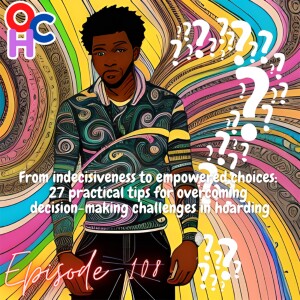
Friday Sep 08, 2023
#108 From indecisiveness to empowered choices: 27 practical tips for overcoming decision-making challenges in hoarding
In this episode, we explore decision making and its connection to hoarding. I dive into neuroscience research, exploring the neural mechanisms of decision making in hoarding disorder, discover how individuals categorise their own possessions versus those of others, and how this impacts their ability to make decisions. I talk ways to improve decision making skills. From flipping a coin to considering our values, setting priorities, and seeking advice, I explore practical techniques that can help anyone struggling with indecisiveness. Along the way, I tackle the fear of uncertainty and how it can hinder decision making. I delve into the different decision making styles that researchers have identified and how understanding these styles can help.
For the transcript for this episode, visit http://www.overcomecompulsivehoarding.co.uk
- Hoarding OCD patients struggle with decision making.
- Differences in decision making for hoarders.
- Anticipating regret
- Test small decisions
- Gather information, set time limits for decisions
- Accepting uncertainty
- Toss a coin, keep perspective, ask advice.
- Consider long-term consequences, stick to decisions.
- Start small; gain confidence in decision-making.
- Learning from past decisions improves future choices.
- Hoarders report anxiety and procrastination in decision making.
- Lack of self-trust skews decision-making
- Hoarding disorder linked to impulsive decisions and self-reliance.
- Differences in categorising own items compared to others'
- Writing down thoughts can clarify complexity and solve problems
- Fear of mistakes leads to decision avoidance.
- Hoarders anticipate regret
- Ask more than "what if"
- Perspective, flexibility, seek advice.
- Stick to decisions and avoid second-guessing or agonising over them.
- Psychology Today: 35,000 choices made daily
- Decisions can be overwhelming
- The butterfly effect and the impact of seemingly insignificant decisions
- Strategies for Decision Making in Hoarding
- Imaginary Person Technique
- Aligning decisions with values to prioritise what is truly important
- How values can guide decision-making in hoarding situations
- Neural Mechanisms of Decision Making in Hoarding
- Study involving brain scans and paper items
- Tossing a coin to make decisions and considering feelings about the result
- Setting priorities, asking "what if" questions
- Being open to different perspectives
- Tolerating uncertainty
- Understanding Decision Making Styles
- No definitive set of decision making styles
- Cultivating Compassion and Making Ethical Choices
- Cultivating self-compassion
- Making compassionate choices for a better quality of life
- Practical Tips for Decision Making in Hoarding
- Starting with small, easy decisions and gradually progressing to more significant ones
- Challenging oneself to try different options and gain decision-making skills
- Learning from past decisions to inform future ones and identify helpful strategies
- Considering long-term consequences rather than focusing solely on immediate ones
- Stepping out of immediate emotions
- Sticking to decisions and avoiding overanalysing or second-guessing
- Difficulty making decisions among patients with hoarding disorder and OCD
- Characteristics of hoarding disorder, including excessive indecisiveness and avoidance
- Hoarding disorder's association with procrastination, indecisiveness, and decision-related fears
Hosted on Acast. See acast.com/privacy for more information.
No comments yet. Be the first to say something!